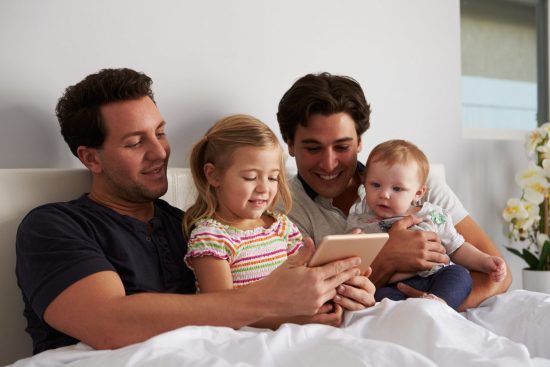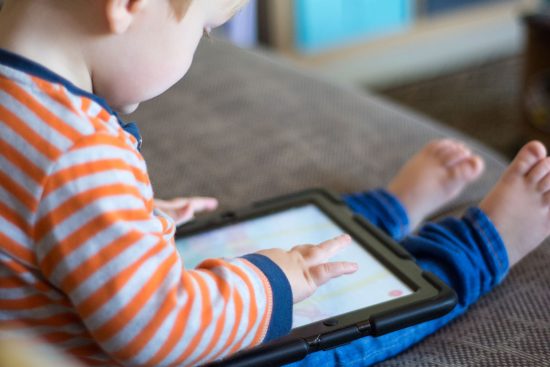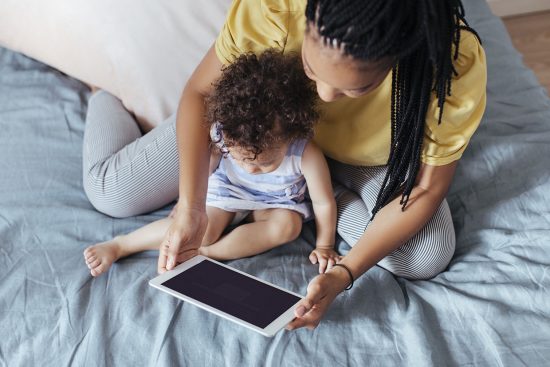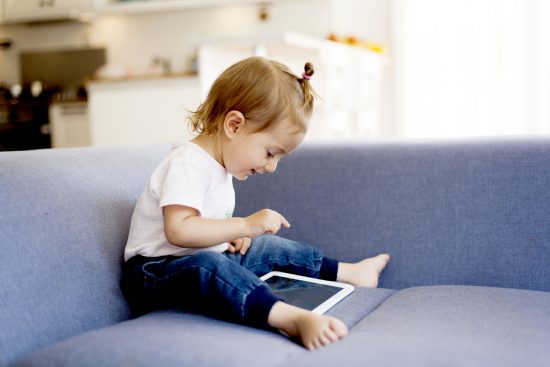Many of us hand smartphones or tablets over to our little one, or switch on the TV, to buy us a little bit of peace and quiet. But how much screen time is too much? And what do we as parents need to know?

Most of us have a lot of technology in our homes – smartphones, tablets, TVs, laptops and games consoles to name a few. Yet screen time for little ones can be a divisive topic, with parents often having strong opinions.
Here we look at the evidence. We weigh up the advantages and disadvantages, and talk to parents about their choices.

Decades of research on screen time has revealed associations with both positive and negative developmental outcomes (see below).
But the evidence is far from conclusive and more research into the effects of screen time on children is needed. This mixed evidence base has led to unclear and contradictory recommendations around screen time for children.
The difficulty is that what constitutes ‘screen time’ is constantly changing.
That’s because newer technologies like tablets, smartphones and apps create different demands on the developing mind than television.
Yet it’s becoming more clear that children establish their activity and screen time habits early on. So it is an important topic for parents and early-years practitioners to be mindful of.
The NHS and NICE recommend an upper limit of two hours per day for all children
In the UK, neither the NHS nor the National Institute of Clinical Excellence (NICE) have any detailed guidance for screen time among babies and toddlers yet. But they do recommend an upper limit of two hours per day for all children.
The UK’s Chief Medical Officer suggests a ‘precautionary approach’ balanced against the potential benefits of using screen devices.
Interestingly, American Academy of Pediatrics guidelines recommend a zero screen time rule (except for video calls) for children under 18 months.
For toddlers aged 18 to 24 months, they suggest a limited amount of screen time. And for two- to five-year-old children, one hour a day. They say screen time should involve educationally appropriate content that children watch with a parent.
The UK’s Royal College of Pediatrics and Child Health (RCPCH) criticised the American guidelines. They argue that they’re not all based on strong evidence.

Increased screen time is linked to many health issues, like obesity and diabetes, as it encourages a more sedentary lifestyle. For example, one study found that children who used screens for more than two hours a day were more likely to have high blood pressure.
One of the more well established health impacts of screen time is on sleep. Several studies have reported strong and consistent evidence that longer screen use during the day is associated with worse sleep. This in turn might affect health and cognitive development.
Another study with six- to 36-month-old children found that as time spent using touchscreens increased, there was a decrease in the amount of sleep; children were also taking longer to go to sleep.
We have to be careful though not to assume that it’s necessarily screen use that is causing worse sleep because it’s only a correlation that was found.
It’s not just physical health that might be affected by too much screen time. One study found that as a child’s daily screen time increased, children reported lower levels of self-worth and self-esteem, and more anxiety and depression. But another large study found that any negative effects of screens on wellbeing were so small that they could not make recommendations about screen use.
Some research in younger children (one to three year olds) who watched TV showed increased levels of attention deficit disorders at the age of seven. Although a more recent review found that evidence for this was weak.
Babies and toddlers learn when adults interact with them alongside screen time
High quality TV programmes and apps aim to help toddlers with their language development, shape and colour recognition, numeracy and literacy.
They also aim to promote problem solving, visual thinking and imagination. Educational apps are those that help toddlers learn these things in active, engaging, meaningful and socially interactive ways.
Babies and toddlers learn when adults interact with them alongside screen time. See our screen time tips article for ideas. If parents choose wisely, apps could benefit children under fives by fostering play and creativity.

Age appropriate screen content and activities might also encourage development. For example, there’s an association between toddlers using interactive touchscreens earlier and them being able to make small, controlled movements – stacking blocks – earlier. On the other hand, screen time has also been associated with delays in reaching developmental milestones between the ages of two and five years.
What appears to be important is having age appropriate content and context (where and who with) for how the screens are used.
By allowing appropriate access to technology, we’re encouraging children to learn important digital skills they’ll need throughout their lives and careers.
Parents often use screen time to get something done around the house. It also gives their constantly-on-the-go little ones a chance to have a break.
Emily Darko, mum to Jess and volunteer with Tottenham NCT branch, says: ‘My two year old watches up to 60 minutes of CBeebies a day. It’s great when I’m alone preparing meals and also when she gets a bit overwrought and needs to calm down.’
Rachel Belcher, mum to Pippa, two, and volunteer with Witney and District NCT branch, also finds the TV a useful tool.

‘Pippa refuses to play on her own most of the time and is very dependent on adults for entertainment. Screen time gives us a much needed break and allows us to do things like have a shower.
‘I have a chronic illness and get very tired, so it also provides important downtime for me to be able to sit with her and have a cup of tea.
‘I would have loved her to have had a screen-free life but for us it’s just not practical.’
Rachel explains that she doesn’t give Pippa anything with adverts to watch and limits her to two hours a day over two or three separate sittings. She also gives Pippa lots of interaction and stimulation at nursery and at home.
‘Usually for at least half the time, one of us will be watching with her and she’s generally good at turning it off when asked. I’m not worried about its effect on her development or mental health.’
Our support line offers practical and emotional support with feeding your baby and general enquiries for parents, members and volunteers: 0300 330 0700.
We also offer antenatal courses which are a great way to find out more about birth, labour and life with a new baby.
Make friends with other parents-to-be and new parents in your local area for support and friendship by seeing what NCT activities are happening nearby.
Read more about the health impacts of screen time, online safety guidance, a good TV guide and a good app guide.